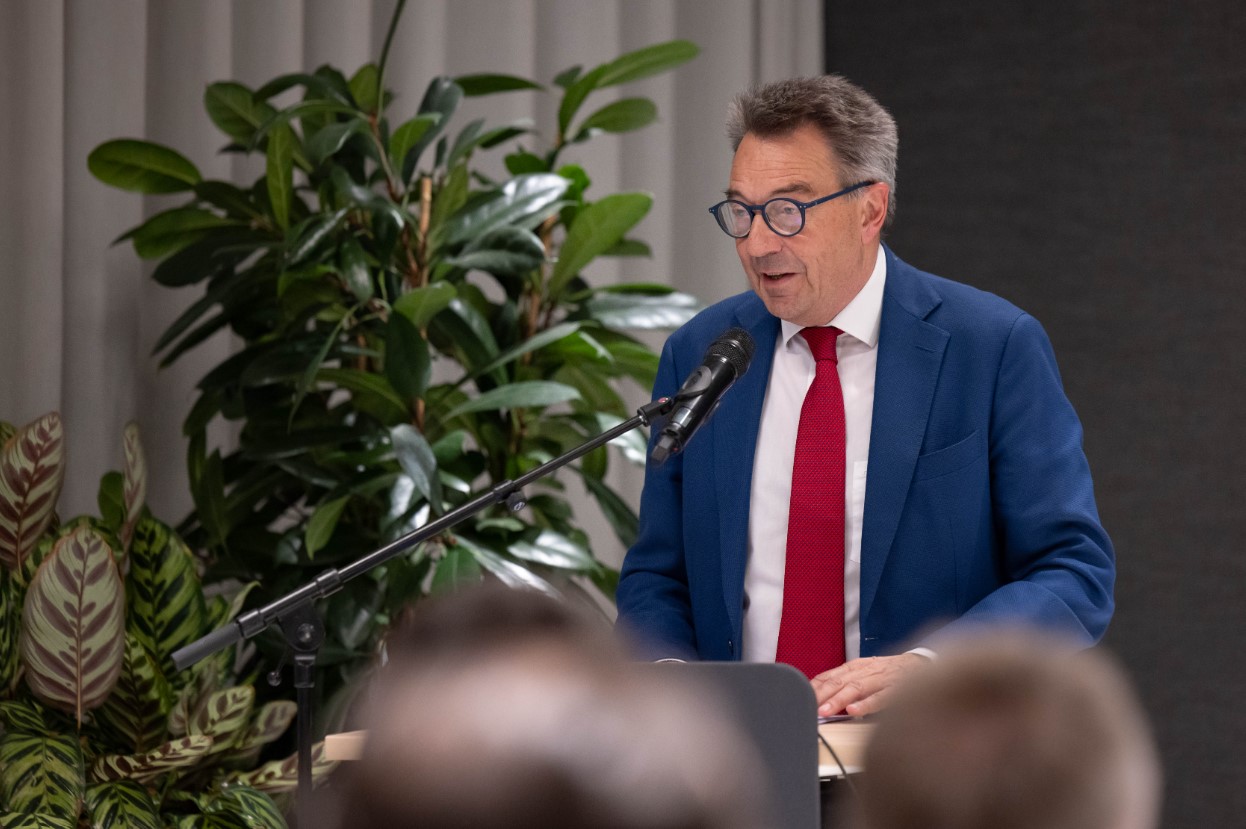Peter Maurer on new priorities in addressing corruption, environment and climate challenges

"Environmental destruction and corruption are two of the greatest global challenges of our time. Both are closely interrelated…”
This was the starting point of a high-level meeting hosted by the Principality of Liechtenstein. Dominique Hasler and Panagiotis Potolidis of the Ministry of Foreign Affairs led the discussions together with Peter Maurer, President of the Basel Institute on Governance, and Juhani Grossmann, Head of our Green Corruption Programme.
The participants took a fresh look at the interconnected threats posed by corruption, environmental degradation and climate change, and at our Green Corruption programme's renewed focus on climate and the energy transition.
In his address, Peter Maurer also reflected on the need for bold collective action across borders to tackle these key global challenges. Our Green Corruption programme – made possible through core funding from Liechtenstein – is a powerful example of how international partnerships and innovative solutions can make a real difference.
An edited excerpt of Peter Maurer’s speech follows:
Building on 20 years of global and national experience in the fight against corruption, we at the Basel Institute have had the opportunity over the last seven years to look more closely at the interfaces between corruption and the environment. In our Green Corruption programme we are working with partners across four continents, supporting both enforcement and corruption prevention.
While the political focus on environmental issues and the protection of natural resources in the past has brought many positive results, we have also seen how corruption and financial crime have become drivers of environmental problems:
- Standards are not adhered to.
- Illegal trade and financial activities lead to new forms of exploitation of nature.
- Regulatory authorities can be influenced, supervisory and enforcement authorities bribed into inaction.
- Climate legislation is manipulated.
And wherever a lot of new funds flow in – like climate finance or renewable energy projects – there are direct and indirect risks of abuse.
Integrity and anti-corruption are crucial in effectively tackling the climate and environmental crisis. But the relevant authorities, such as law enforcement and environmental protection agencies, cooperate very little, either with each other or with other stakeholders.
The good news is: There are encouraging examples. Our broad geographical focus allows us to take stock and make concrete suggestions for the future.
Where corruption and environmental issues converge
Our Green Corruption team is intensifying efforts in key areas where we see corruption undermining our collective ability to tackle the climate crisis: the energy transition and climate finance.
Energy transition
Renewable energy is essential to address climate change. The renewables sector comes with new regulations, financial flows, processes, actors. The new settings also mean new integrity risks to address.
In addition, renewable energies depend on the mining of critical raw materials. Lithium or nickel, for example, are used in the production of batteries or renewable power generation in turbines or solar modules.
There is growing long-term demand for the mining of these minerals. The increasing competition for these resources invites new players, such as technology companies and commodity traders. And this new rush is accompanied by numerous corruption scandals.
Despite the high risks, very few safeguards are put in place to prevent corruption from undermining the effective, consensual and sustainable extraction of critical materials.
In the next phase of our Green Corruption programme, we are starting detailed investigations into corruption risks, including with regard to lithium in Ukraine and nickel in Indonesia. These studies will also help us to support government authorities in strengthening their internal controls and risk mitigation measures.
Climate finance
We all know today that tackling the effects of climate change will require enormous investments. These are necessary to a) slow down climate change, and b) prepare and adapt to the unavoidable effects of the changing climate.
Despite these two strategies being subject to political volatility, the basic facts make this an even stronger growth area in the medium to long term. The UN puts the cost of tackling climate change at USD 5.5 trillion a year. This is more than the combined GDP of Germany and Switzerland. Very substantial financial resources are already being invested in mitigating and adapting to climate change.
As money is tight and climate change compete with other financial priorities like defence and migration, we need to get more out of existing funds. That means ensuring that they are not lost to corruption.
Unfortunately, our partners at Transparency International are documenting a growing number of corruption incidents in climate initiatives: Bribery to secure land for carbon capture; permits and licences for infrastructure that can only be obtained through corruption; bribes for environmental impact assessments; corruption in the certification and sale of carbon credits.
There are multiple, complex reasons for corruption being present in the responses to climate change. These range from weak internal controls and excessive decision-making powers at environmental regulatory authorities to poorly designed and safeguarded carbon offsetting projects.
Overall, our efforts aim to boost cooperation between different actors to help integrity standards and better practice to take hold. There is a need for greater understanding of systemic issues, more effective training and better legal, political and institutional guidance.
Seeking answers
The international community is faced with a number of pertinent questions:
- How can we use the money we have to make an impact on important problems relating to the environment, climate change, biodiversity, water and food?
- How can we build on market forces and support competitive companies that contribute to the necessary energy and economic policy changes?
- How can we make access to critical materials transparent so that we can better utilise them to bring about environmental and energy policy change globally?
- How can we better harmonise regulatory measures and our own initiatives?
Finding and implementing answers to these questions is challenging, not least in the face of geopolitical volatility and transactional politics. But it also presents opportunities for players of all sizes, including small and medium-sized countries, to show leadership, push for innovative solutions and get involved in tangible ways.
The Principality of Liechtenstein is doing just that. Its support of initiatives at the intersection of corruption and the environment such as our Green Corruption programme goes a long way.




